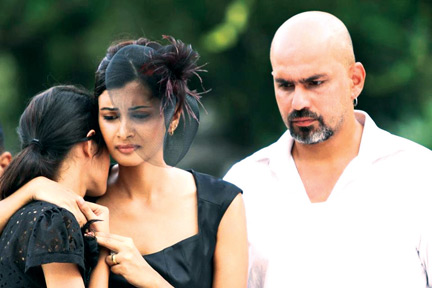Que Sera, a cinematic ‘Koan’
by Kalakeerthi Dr. Edwin Ariyadasa
|

A scene from the film |
“Glendower: I can call spirits from the vasty deep. Hotspur: Why, so
can I, or so can any man;
But, will they come when you do call them?”
William Shakespeare
When Zen Buddhist teachers train their pupils in spiritual
discipline, they saddle each of them, with an intricate riddle. These
spiritual puzzles are so knotty, that, normal levels of thinking cannot
unravel them.
The pupils have to strain their minds hard, pushing their
thought-processes, beyond usual limits.
This intense effort results in sudden revelations, awakening the mind
into startlingly new perceptions. These Zen Riddles, are termed ‘Koans.’
Their solution leads to Katsu – spiritual liberation.
To me, director Parakrama Jayasinghe’s Que Sera, is a cinematic ‘Koan’,
pushing the filmgoer’s mind into an unorthodox state of cinematic
experiencing.
|

Director Parakrama Jayasinghe |
Response
In the first instance, the average cinemagoer’s response is quite
likely to be a state of sunned bewilderment. He will, consciously or
routinely, begin to explore his inner being to discover what kind of
echo he can elicit, out of the snatch of song (Que Sera) that functions
as the title of this film.
Whether one is familiar with this song or not, the aura of
associations that has grown around this piece of music, transmits a
subtle message to us.
Incidentally, this song, possesses a fairly long history. In our day,
Que Sera Sera (what will be, will be)” had found its way into Alfred
Hitchcock’s film - The Man Who knew Too Much (1956).
But, even in 1956, the song had a far flung past. It had been adapted
back in the 16th century as an English heraldic motto. The song evokes a
feeling of sophisticated resignation to one’s allotted destiny. Again,
it implies giving into inevitable Kamma.
Awareness
Director Parakrama Jayasinghe, named his film that way. I am quite
certain, with a complete awareness of what he was doing.
His cinematic narration, is propelled forward, by an assortment of
characters, that receives their lot, with a non-grumbling acceptance.The
film opens with a visual sequence, that observes a solemn funeral
service, at the public cemetery.
Such an inaugural scene, will invariably administer at least a slight
visual shock, on Sri Lankan viewers – especially the central theme
evolves around a funeral parlour.
The director handles with an admiration and an impressive creative
poise, the morbidity, implicit humour and the intriguing mystery,
pervading the totality of the film with an adroit cinematic skill. If
one were to observe with care, one could appreciate his cinematic
imagination, especially in his deployment of the actors and actresses in
bit parts.
This creative adeptness is especially evident in the cameo role,
rivetingly played by Damith Fonseka depicting a gangster boss from the
lower depths.The director achieves a praiseworthy triumph when he
seamlessly merges the seen world with the world unseen.
The average Sri Lankan film director invariably proves creatively
unskilled, when he attempts to handle both spirits and humans together.
But, director Jayasinghe, deploys the two categories – the humans and
the spirits – with stylistic ease, as if they always co-exist.
The director is equally deft in manipulating trilingual dialogue
conversations drift from Sinhala into English without registering even
the slightest trace of awkwardness in the transition.
While providing what at times seems a morbid entertainment, Que Sera
adopts a cynical objectivity. If a sustaining philosophy is muted to an
undertone in this film, it can be summed up this way: “Behold the
starkly true nature of man. There is little idealistic glory to his way
of existence. He exploits what is exploitable.”The acting levels of the
totality of the cast are restrained by a cinematic discipline. The
director sounds a moral note as well. The avenging ghost is finally
persuaded to forget the human style of revenge and to exert a “ghostly”
sympathy and understanding towards the fickleness of the mere humans.
Most players in the film have a difficult demand placed upon their
character portrayals. They must, in most instances, adopt a finely
balanced duality – communicating seriousness and humour touched by a
trace of cynicism and irony.
In a team of this stature, all names qualify for kudos – Hans,
Michelle, Yoshini – for instance.It is a vast pity, if films of the
calibre of Que Sera are not duly recognised, for their unambiguous
contribution towards the enrichment of the cinematic art of our land.
Director Parakrama Jayasinghe has quite effectively indicated the limits
of the truly possible for creative film-makers of this land. |

